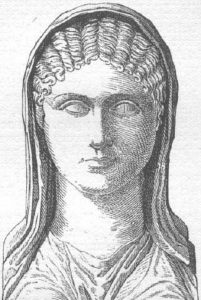 Aspasia was a greek rhetorician, philosopher, and even a source of medical expertise. She married the statesman Pericles in Athens and had a son with him. In Plato’s Menexenus, Socrates refers to her as his teacher of rhetoric. Her close ties to the intellectuals of her time, including Socrates himself, make her one of the most fascinating female figures of antiquity – a woman who not only participated in a male-dominated discourse but actively shaped it.
Aspasia was a greek rhetorician, philosopher, and even a source of medical expertise. She married the statesman Pericles in Athens and had a son with him. In Plato’s Menexenus, Socrates refers to her as his teacher of rhetoric. Her close ties to the intellectuals of her time, including Socrates himself, make her one of the most fascinating female figures of antiquity – a woman who not only participated in a male-dominated discourse but actively shaped it.
What is particularly intriguing is that Aspasia reappears in medical texts of Late Antiquity. In his monumental work Libri medicinales, the physician Aëtius of Amida cites her as an expert in gynecology and obstetrics. This reference suggests that knowledge by and about women was not only transmitted but also actively integrated into medical practice – through women like Aspasia.
This medical dimension of Aspasia was the subject of Irene Calà’s talk “Aspasia and the Others: Women and Medicine in Late Antiquity”, which opened the lecture series “Fertility, Maternity, Reproduction: Women’s Ideas in the History of Medicine”, organized by Dr. Jil Muller, on March 19. Calà examined the role of female medical sources in Late Antique texts and demonstrated how Aspasia appears in Aëtius’ work as a credible authority – as a woman speaking about the female body.
The New Voices Research Profile of Hilary Ilkay also builds on this line of inquiry. Ilkay studies the reception of female figures in the history of philosophy, especially Diotima from Plato’s Symposium. Her research asks how women thinkers throughout the centuries have engaged with figures like Diotima and Aspasia – as role models, as evidence of women’s intellectual capacity, as symbols of resistance to patriarchal narratives.
You cannot copy content of this page








